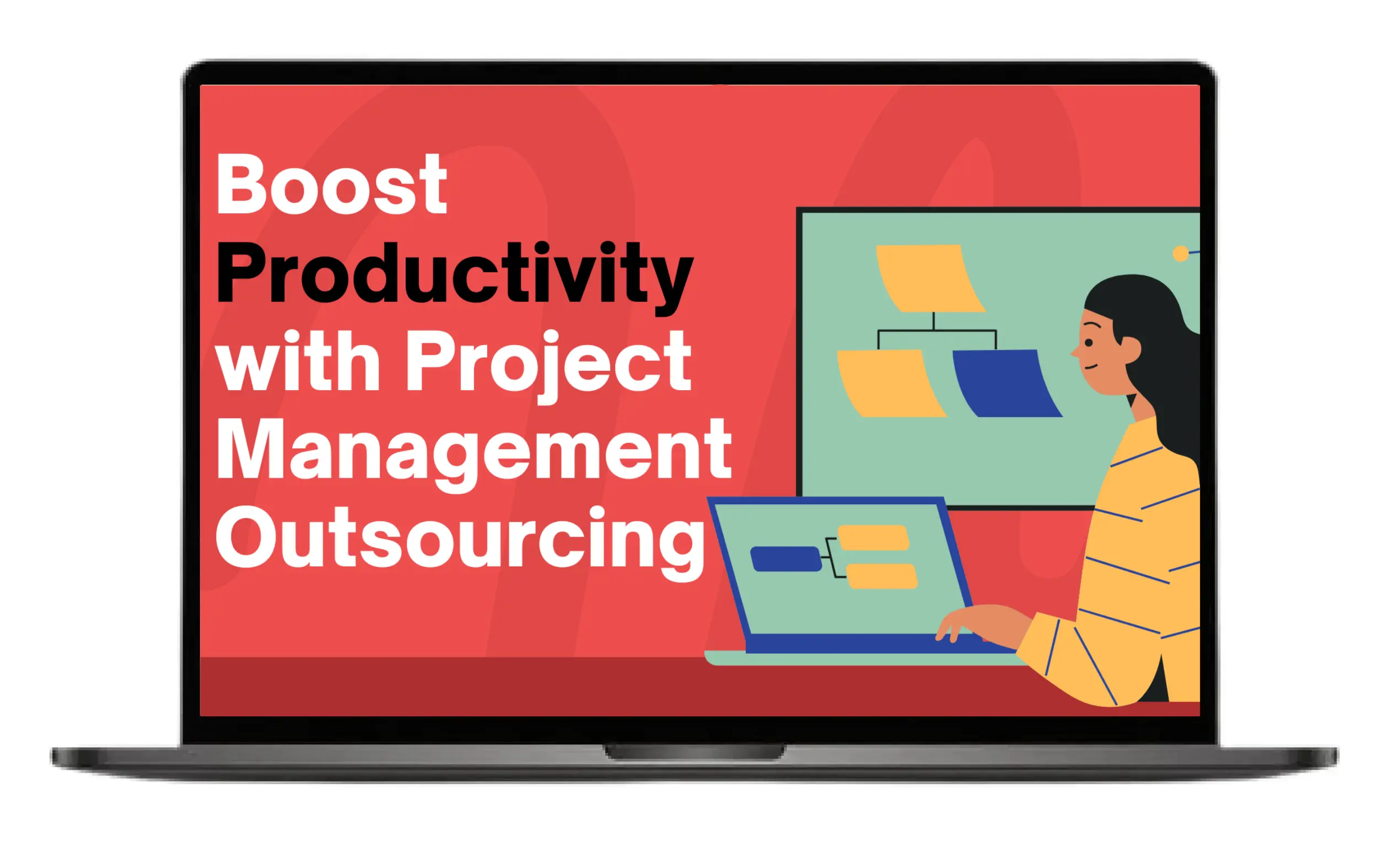
In 2025, project management tools are more important than ever for teams of all sizes. These tools help you organize tasks, track progress, and collaborate efficiently. Whether managing a small project or a large team, the right tool can make a big difference in your workflow.
From simple task tracking to advanced project planning, there are many options. In this blog, we’ll explore the best project management tools for 2025, highlighting their pros, and cons, and how they can help you stay on top of your projects.
Best Project Management Tools in 2025
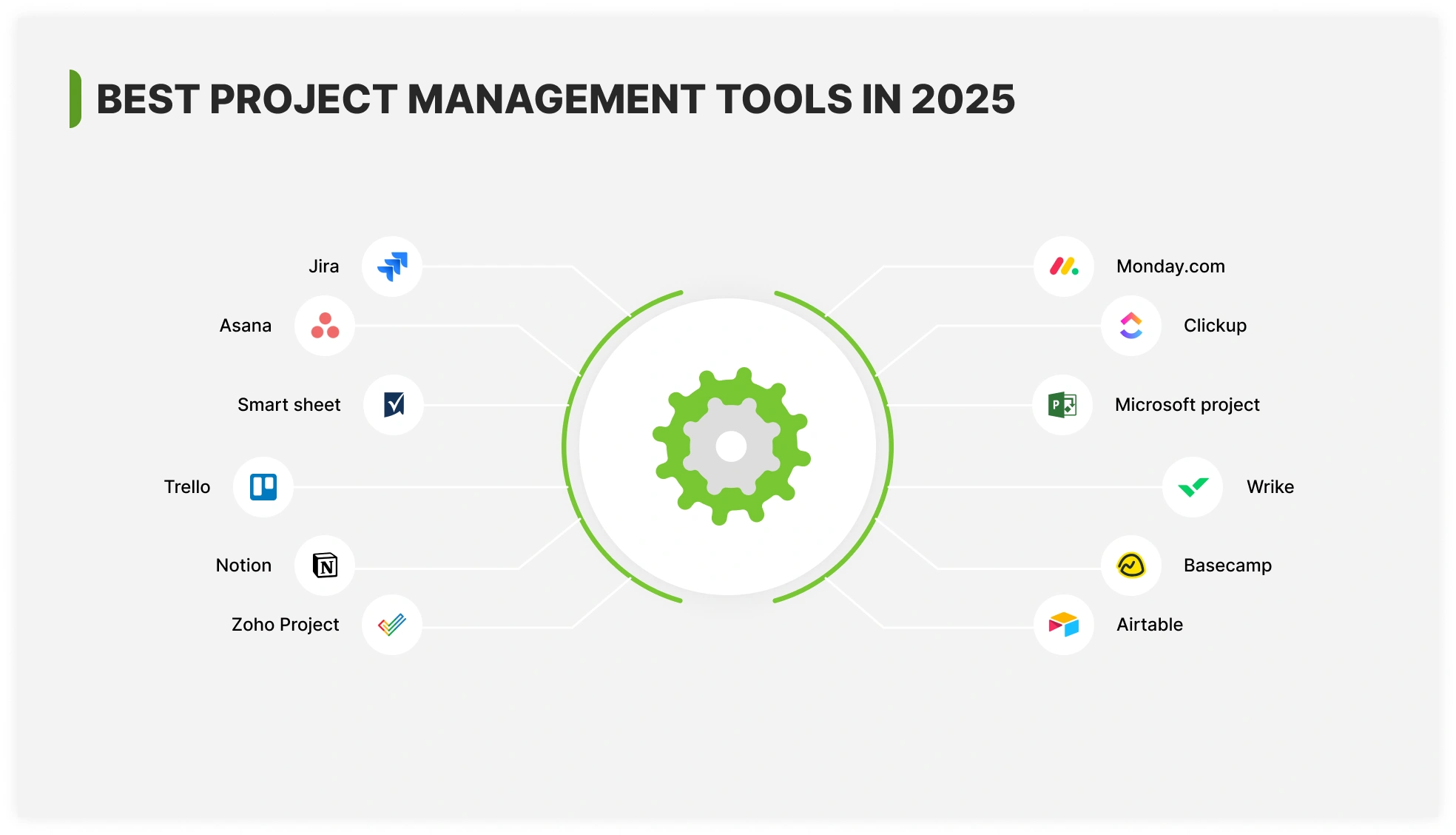
1. Jira
Jira is ideal for software development teams needing bug tracking and agile project management tools. Software development teams are the main users of Jira, an effective tool for agile project management. It makes it possible to track jobs, issues, and user stories in great detail.
Jira is perfect for managing complicated software projects since it assists teams in conforming to agile approaches like Scrum or Kanban. Additionally, it works well with other development tools, providing IT teams with a complete solution.
Pros Of Jira
- Great for managing projects in an agile approach.
- Excellent for monitoring problems and bugs.
- Incredibly adaptable for development teams.
- Has strong integration with development tools.
Cons of Jira
- Complicated interface for teams that aren't technology experts.
- Is costly for small companies.
- Difficult for new users to learn.
2. ClickUp
Task tracking and complicated procedures for all teams are just two of ClickUp's many features. ClickUp is a full project management application. It facilitates easy collaboration, work tracking, and project management for teams.
It connects with numerous tools and provides views that can be customized. ClickUp works well for both simple and large tasks and is ideal for teams of any size. Let's have a look at ClickUp's pros and cons:
Pros Of ClickUp
- Multifunctional tool in one.
- Task views are customizable.
- Connects to a variety of tools.
- The free plan offers a lot of features.
Cons of ClickUp
- Advanced features might need to be manually set up.
- The free plan has limitations on several advanced capabilities.
- Analytics and reporting can be less user-friendly.
3. Monday.Com
Monday.com is a high degree of customization that enables customized workflows for various sectors and teams.
Monday.com is a flexible project management platform that assists groups in developing unique workflows. It offers a variety of features, such as timelines and boards, to make tracking progress simple. Because of its adaptability to a broad range of needs and sectors, it works well for companies of all sizes.
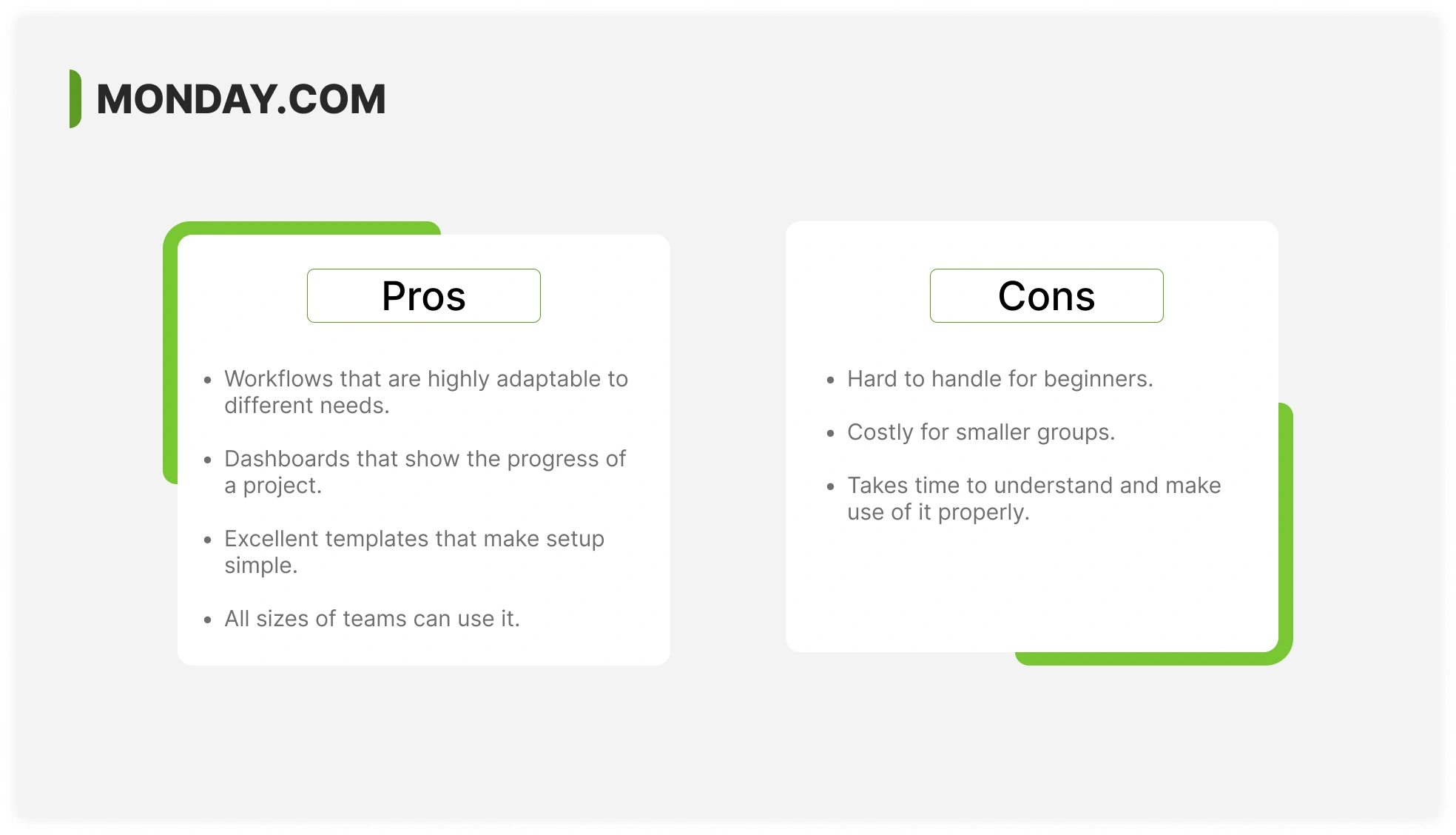
Pros Of Monday.com
- Workflows that are highly adaptable to different needs.
- Dashboards that show the progress of a project.
- Excellent templates that make setup simple.
- All sizes of teams can use it.
Cons of Monday.com
- Hard to handle for beginners.
- Costly for smaller groups.
- Takes time to understand and make use of it properly.
4. Asana
For teams that require task tracking and transparent progress visibility. Asana is an excellent choice. There are several task views offered. Asana facilitates task management, tracking, and organization for teams in a single location.
It is known for its adaptable project views, which let users see work as timelines, boards, or lists. For both small and large teams, Asana is useful for simplifying project management, increasing task visibility, and keeping teams on schedule.
Pros Of Asana
- Provides the list, board, and timeline views.
- Facilitates easy and clear team progress tracking.
- Works well with lots of different tools.
- Perfect for monitoring big and small projects.
Cons of Asana
- Difficult for newbies to pick up quickly.
- Advanced features are absent from the free plan.
- Limited customization is possible without a premium plan.
5. Trello
Trello is a popular project management tool that helps you organize tasks visually. It tracks work using boards, lists, and cards. Each task is shown as a card, and you can move cards across lists to show progress (like moving a task from "To Do" to "In Progress").
Trello is easy to use and works well for small teams, freelancers, and simple projects. Its visual design makes it easy to understand and manage tasks.
The best part is that Trello’s free version is available to most users.
Pros Of Trello
- Easy to use with simple interface.
- Task tracking is made clear through visual boards.
- The organization is made easy with drag-and-drop capability.
- The free plan has a lot of helpful features
- Ideal for small projects and teams.
Cons of Trello
- Lack of advanced capabilities needed for complex projects
- Limited possibilities for customization in as big operations
- With too many boards it becomes messy and crowded
- Not the best options for handling dependencies
- When compared to competitors, the reporting tools are basic.
6. Microsoft Project
For large teams who require advanced project planning and scheduling tools, Microsoft Project is the best option. Microsoft Project is a full-function application for large-scale project management. Gantt charts, resource management, and budget tracking are among its advanced capabilities. Below are the pros and cons of Microsoft Project:
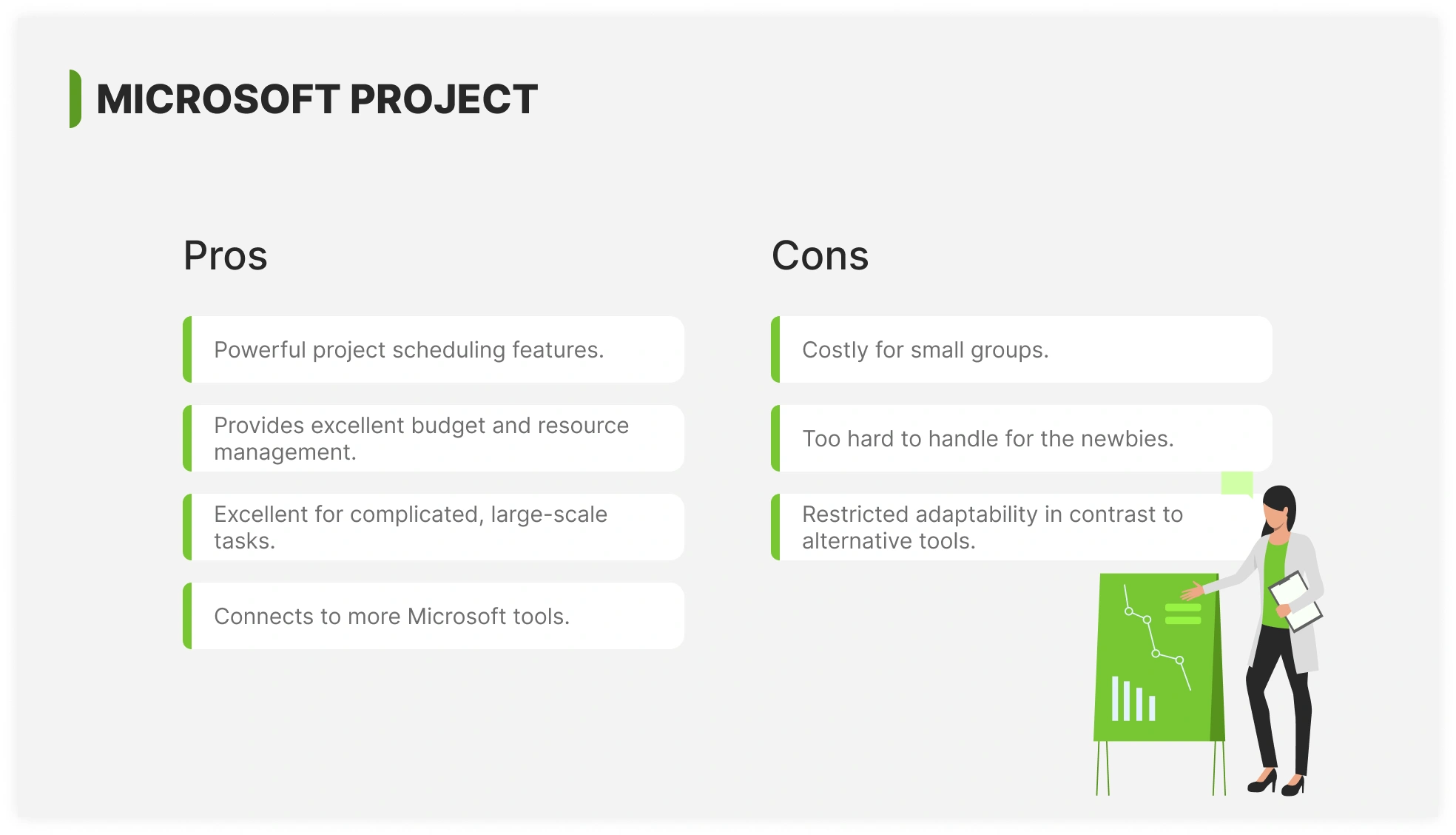
Pros Of Microsoft Project
- Powerful project scheduling features.
- Provides excellent budget and resource management.
- Excellent for complicated, large-scale tasks.
- Connects to more Microsoft tools.
Cons of Microsoft Project
- Costly for small groups.
- Too hard to handle for the newbies.
- Restricted adaptability in contrast to alternative tools.
7. Smartsheet
For handling projects with complex dependencies and deadlines, Smartsheet is perfect. Spreadsheets and project tracking are combined in Smartsheet, a flexible project management application.
Teams that require detailed project planning, resource management, and real-time collaboration will find it ideal. Smartsheet also has pros and cons:
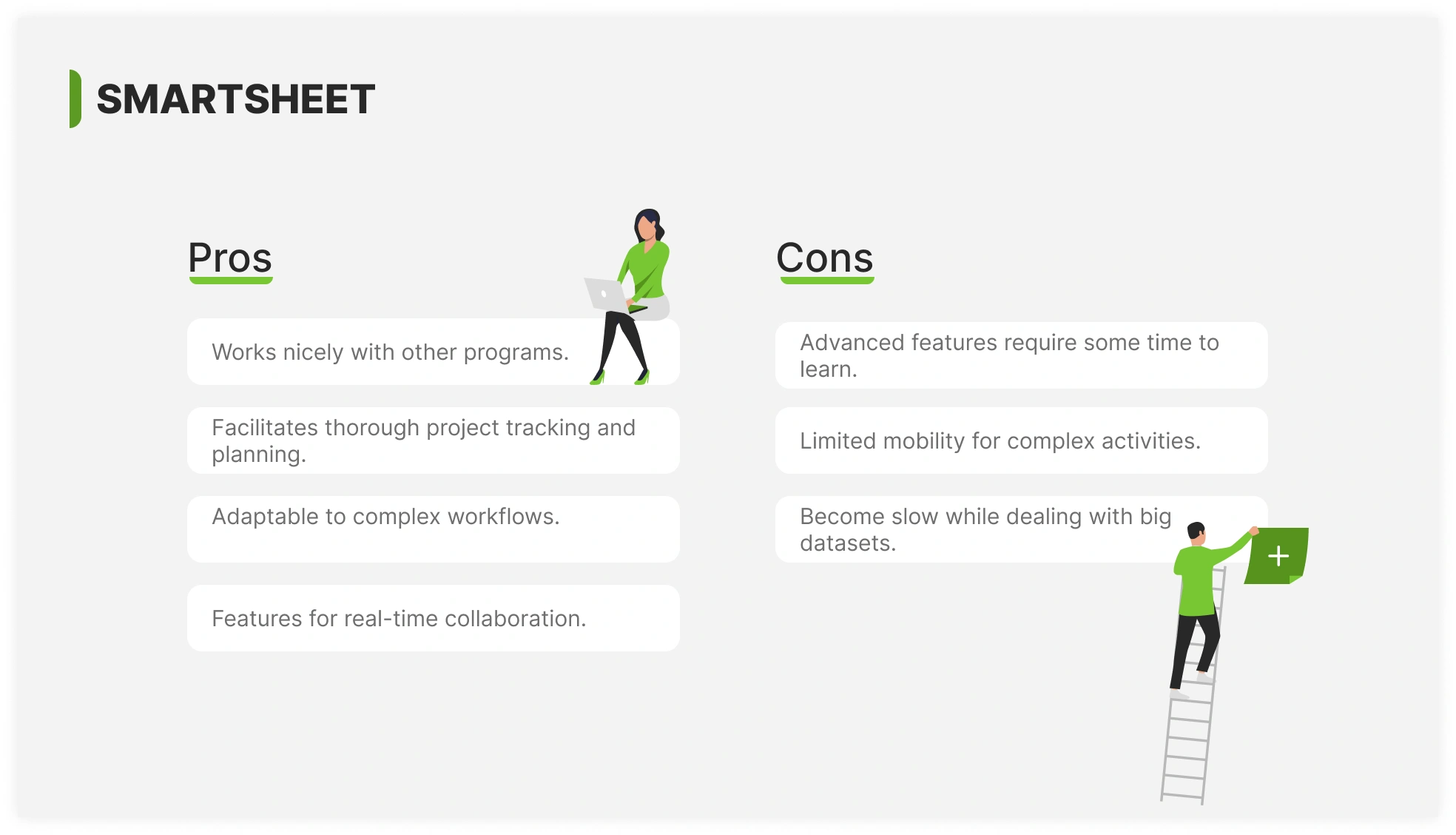
Pros Of Smartsheet
- Works nicely with other programs.
- Facilitates thorough project tracking and planning.
- Adaptable to complex workflows.
- Features for real-time collaboration.
Cons of Smartsheet
- Advanced features require some time to learn.
- Limited mobility for complex activities.
- Become slow while dealing with big datasets.
8. Basecamp
Basecamp is known for its ease of use and emphasis on task management and team communication. It is a simple project management application made to facilitate teamwork. On a single platform, it combines file sharing, team messaging, and to-do lists.
Projects remain structured because of Basecamp's simple UI, which doesn't overwhelm users. With fewer complicated features, it's perfect for teams who want clarity and simplicity in communication. Let's have a look at the pros and cons of Basecamp:
Pros Of Basecamp
- Easy-to-use interference
- Combines project management and communication
- Pricing is flat and doesn't charge per user
- Ideal for small tasks and small teams
Cons of Basecamp
- Lacks advanced features needed for complex projects.
- Limited ability to customize tasks
- There is no built-in time tracking
9. Wrike
Wrike is ideal for groups that require real-time collaboration and complete project tracking. It is a project management application designed to improve transparency and teamwork. Gantt charts, task tracking, and time monitoring are among its functions.
Teams can easily manage complex projects and maintain alignment because of Wrike's real-time updates. It's perfect for companies who want a strong tool with a simple-to-use interface.
Pros Of Wrike
- Provides time tracking and Gantt chart
- Allows for updates and cooperation in real-time
- Workflow that can be modified for various teams
- Connects to other well-known tools.
Cons of Wrike
- Limited offline capabilities
- Takes a lot of time during customization
- Does not have a good mobile app experience.
10. Airtable
Airtable is ideal for customizable project management, blending spreadsheet simplicity with database flexibility.
Airtable is a project management solution that combines advanced database features with spreadsheet capability. Teams can use it to organize tasks, track projects, and build unique perspectives in an eye-catching approach.
Pros Of Airtable
- Incredibly adaptable and customizable.
- Combines the capabilities of spreadsheets with databases.
- Provides alternatives for integration and automation.
- Multi-view, user-friendly UI.
Cons of Airtable
- Can be costly for bigger groups.
- Fewer reporting options than comparable products.
- Can get confusing when there is too much information.
11. Notion
Notion is a flexible workspace that integrates task management, note-taking, and teamwork into a single platform. Notion is a multipurpose workspace for managing calendars, databases, tasks, and notes. It makes it simple for teams to share documents and create unique workflows.
Pros Of Notion
- Incredibly adaptable and flexible to different workflows.
- Excellent for creating customized templates.
- Integrates databases, tasks, and notes into one platform.
- Document sharing and collaboration are simple.
Cons of Notion
- Gantt charts and other advanced project management tools are absent.
- May take longer when dealing with complicated datasets and big teams.
- Mobile users have limited offline functionality.
12. Zoho Project
For teams looking for a complete yet reasonably priced project management system, Zoho Projects is the best option. Task management, Gantt charts, and time tracking are just a few of the features that Zoho Projects, a project management application, offers. It is ideal for teams who are already utilizing Zoho's suite of products because it connects easily with other Zoho apps.
Pros Of Zoho Project
- Provides task management tools including Gantt charts.
- Smooth interaction with the Zoho toolkit.
- Reasonably priced for small and medium-sized groups.
- Excellent for monitoring project resources and schedules.
Cons of Zoho Project
- Lacks some of the more complicated functions that competitors have.
- There may not be as much room for customization in some places.
- For technical activities, the mobile app may be less user-friendly.
Benefits of Using Project Management Tools
Here is a brief overview of the reasons why project management tools are so important.
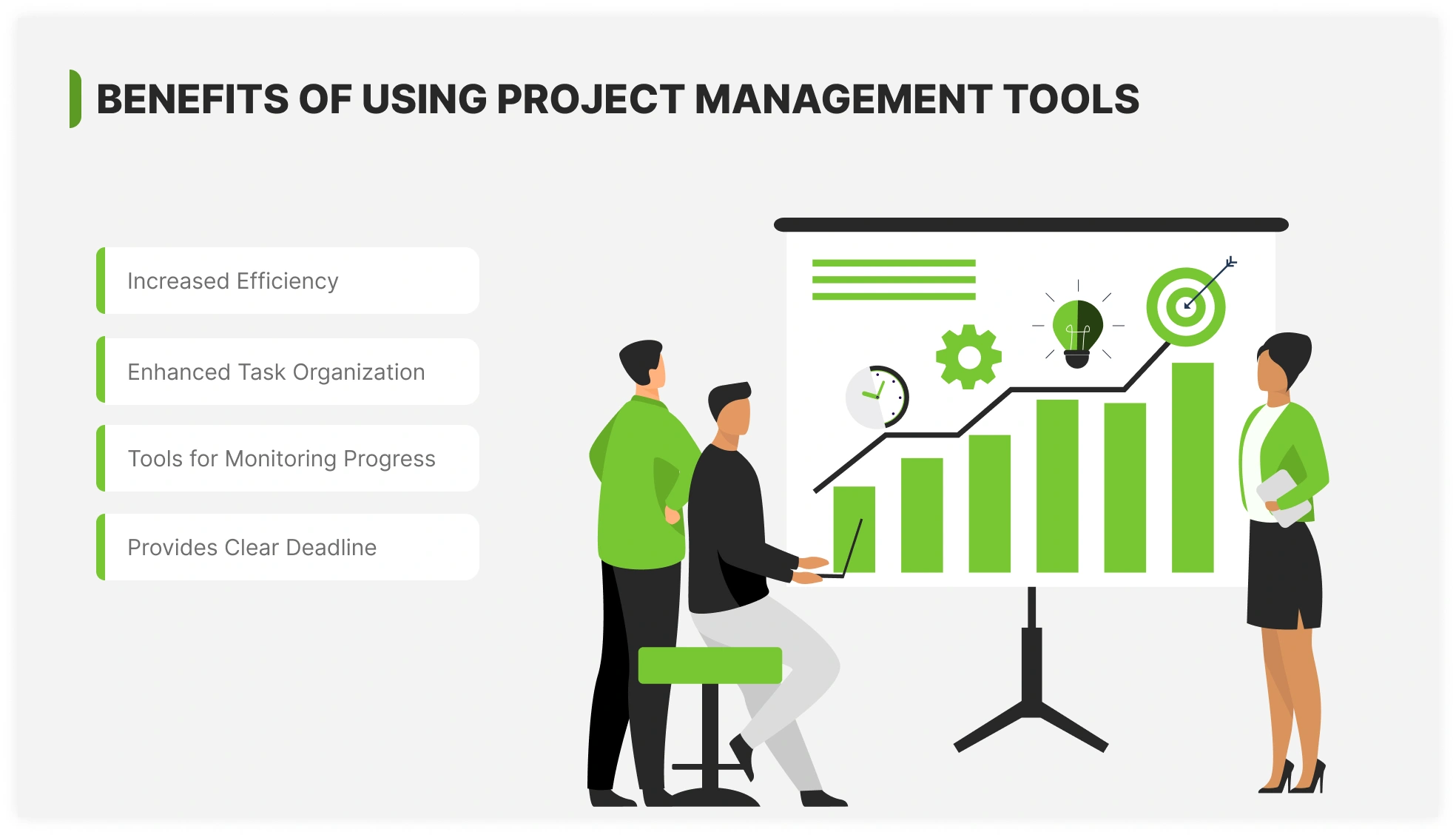
Increased Efficiency
Project management tools increase productivity by automating repetitive processes and streamlining intricate workflows. They eliminate contradicting information and save time on updates by establishing a single, agreed source of truth.
It has controlled document access for stakeholders, automated tasks with conditions, and set reminders using these tools. Think of them as an additional resource for your tasks.
Enhanced Task Organization
The tasks are clear and simple to do. Everyone is aware of their responsibilities. Projects stay on track and organized as a result.
Tools for Monitoring Progress
Real-time task status is displayed using project tools. Teams view what has been completed and what requires improvement. Accountability is improved by this.
Provides Clear Deadline
Everyone is aware of their priorities when deadlines are set. Teams are constantly reminded about the deadlines using the project tools.
Project Management And Red Star Technologies
Red Star Technologies is aware of how important successful project management is to the company's success. Our team specializes in utilizing the newest project management solutions to improve teamwork, accelerate procedures, and guarantee results are delivered on time.
We customize solutions to fit the particular requirements of every project, regardless of its size or complexity, with a strong emphasis on efficiency.
Working with us gives you access to professional management, the most advanced tools, and smooth cooperation, freeing up your team to concentrate on what matters and achieve your objectives. You can rely on Red Star Technologies to manage your projects with dedication and accuracy.
Frequently Asked Questions
1. Which project management tool is most widely used?
Trello is among the most widely used project management tools.. It’s simple, visual, and easy to use for task tracking. Many teams rely on it for small to medium projects.
2. What is a useful tool for project managers?
Asana is an effective tool for project managers. It helps track tasks, timelines, and team progress. Its flexibility makes it suitable for various project types.
3. Which software is used for project management?
Trello, Asana, and Monday.com are the popular project management software. These tools help organize tasks, track progress, and collaborate effectively. They are widely used by teams of all sizes.
4. How to choose a project management tool?
Choose a project management tool based on your team's needs. Consider factors like ease of use, features, and integration with other tools. Ensure it suits your project size and workflow style.
5. What is a tool technique in project management?
A tool technique in project management refers to methods or software used to plan, track, and execute projects. These techniques help streamline tasks, manage resources, and ensure timely completion of project goals.
Conclusion
The trick is selecting the right project management tool. It keeps groups focused and structured. Choose the option that best suits your needs from the many that are offered. For teams of any size, tools like Monday.com, Asana, and Trello provide excellent features. Consider each carefully, as each has advantages and disadvantages.
You may increase teamwork and production by utilizing the appropriate tool. It will keep projects on schedule, reduce errors, and save time. Choose the one that best fits your project requirements and workflow. At Red Star Technologies, we help you choose and implement the best tools for your projects.










